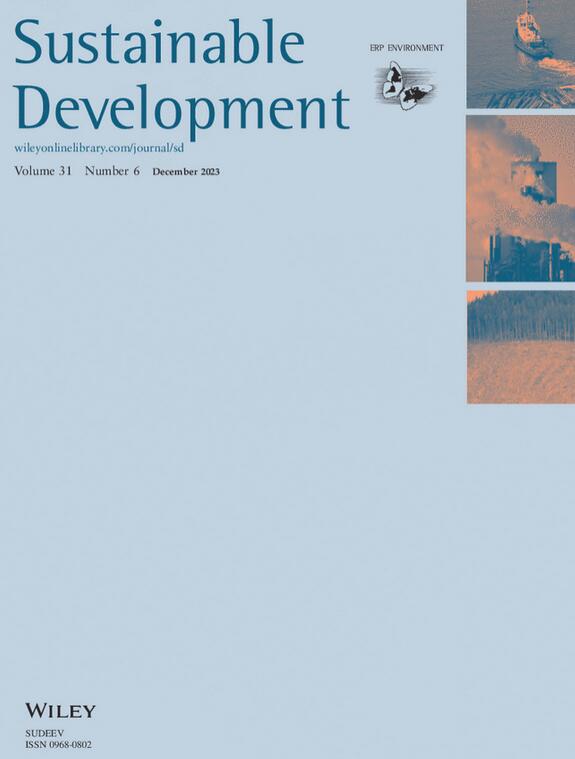Transitions towards green productivity in Africa: Do sovereign debt vulnerability, eco‐entrepreneurship, and institutional quality matter?
IF 8.2
1区 环境科学与生态学
Q1 DEVELOPMENT STUDIES
引用次数: 0
Abstract
Improving green productivity (GP) is critical for achieving global sustainable green development. Yet, past efficiency studies on the African continent have ignored Africa's GP, estimation, and driving factors. Specifically, the role of sovereign debt vulnerability, environmental entrepreneurship, and institutional quality in ensuring Africa's green productivity development is lacking. Therefore, this study built a meta‐frontier biennial weighted modified data envelopment analysis (DEA) model to evaluate green productivity across resource‐intensive and non‐resource‐intensive African countries from 2010 to 2019. Further, the study adopted the global Malmquist‐Luenberger productivity index (GML) to investigate the dynamic changes in African green productivity growth. The results suggest that only a few African countries are efficient, implying more room for improvement for the other countries. The heterogeneity of green productivity across the resource's classification exhibits significant disparity. The technology gap also prevails among the two resource classifications of African countries. The GML index indicates that Africa's green productivity is mainly explained by technical change instead of efficiency change. The bootstrap truncation regression suggests an inverted U‐shaped nexus between growth and green productivity in Africa and resource‐intensive countries (RIC). Green environmental entrepreneurship positively affects green productivity in Africa. On the components of institutional quality, we observed that the rule of law positively influences green productivity in non‐resource‐intensive countries (NRIC) and the whole of Africa. In contrast, political stability, government effectiveness, voice and corruption negatively affected green productivity in NRIC. Also, foreign direct investment (FDI) and sovereign debt vulnerability negatively correlate to green productivity in Africa as a whole and NRIC, respectively. The findings of this study aid in raising awareness of green productivity in developing countries, which is crucial in boosting global green development.非洲向绿色生产力的转型:主权债务脆弱性、生态创业精神和机构质量是否重要?
提高绿色生产力(GP)对于实现全球可持续绿色发展至关重要。然而,以往针对非洲大陆的效率研究却忽视了非洲的 GP、估算和驱动因素。具体而言,缺乏对主权债务脆弱性、环境企业家精神和机构质量在确保非洲绿色生产力发展中的作用的研究。因此,本研究建立了一个元前沿两年期加权修正数据包络分析(DEA)模型,以评估 2010 年至 2019 年非洲资源密集型和非资源密集型国家的绿色生产力。此外,该研究还采用了全球马尔基斯特-伦伯格生产力指数(GML)来研究非洲绿色生产力增长的动态变化。结果表明,只有少数非洲国家是高效的,这意味着其他国家有更大的改进空间。不同资源分类的绿色生产率差异显著。非洲国家的两种资源分类之间也普遍存在技术差距。GML 指数表明,非洲的绿色生产率主要由技术变化而非效率变化来解释。自举截断回归表明,非洲和资源密集型国家(RIC)的经济增长与绿色生产率之间存在倒 U 型关系。绿色环境创业对非洲的绿色生产率有积极影响。在制度质量方面,我们发现法治对非资源密集型国家(NRIC)和整个非洲的绿色生产率有积极影响。相反,政治稳定性、政府效率、发言权和腐败则对非资源密集型国家的绿色生产力产生负面影响。此外,外国直接投资(FDI)和主权债务脆弱性分别与整个非洲和非资源密集型国家的绿色生产力呈负相关。本研究的结果有助于提高发展中国家对绿色生产力的认识,这对推动全球绿色发展至关重要。
本文章由计算机程序翻译,如有差异,请以英文原文为准。
求助全文
约1分钟内获得全文
求助全文
来源期刊

Sustainable Development
Multiple-
CiteScore
17.30
自引率
11.20%
发文量
168
期刊介绍:
Sustainable Development is a publication that takes an interdisciplinary approach to explore and propose strategies for achieving sustainable development. Our aim is to discuss and address the challenges associated with sustainable development and the Sustainable Development Goals. All submissions are subjected to a thorough review process to ensure that our readers receive valuable and original content of the highest caliber.
 求助内容:
求助内容: 应助结果提醒方式:
应助结果提醒方式:


